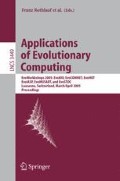Abstract
Abstract. The use of Cellular Automata (CA) for musical purposes has a rich history. In general the mapping of CA states to note-level music representations has focused on pitch mapping and downplayed rhythm. This paper reports experiments in the application of one-dimensional cellular automata to the generation and evolution of rhythmic patterns. A selection of CA tendencies are identified that can be used as compositional tools to control the rhythmic coherence of monophonic passages and the polyphonic texture of musical works in broad-brush, rather than precisely deterministic, ways. This will provide the composer and researcher with a clearer understanding of the useful application of CAs for generative music.
Access this chapter
Tax calculation will be finalised at checkout
Purchases are for personal use only
Preview
Unable to display preview. Download preview PDF.
References
Beyls, P.: The Musical Universe of Cellular Automata. In: International Computer Music Conference, ICMA, Columbus Ohio, pp. 34–41 (1989)
Burraston, D., Edmonds, E.: Global Dynamics Approach to Generative Music Experiments with One Dimensional Cellular Automata. In: Australasian Computer Music Conference, ACMA, Wellington (2004)
Hoffman, P.: Towards an “Automated Art”: Algorithmic Processes in Xenakis’ Compositions. Contemporary Music Review 21(2/3), 121–131 (2002)
Millen, D.: Cellular Automata Music (1988-2004), http://comp.uark.edu/~dmillen/cam.html
Millen, D.: Cellular Automata Music. In: International Computer Music Conference, ICMA, Glasgow, pp. 314–316 (1990)
Miranda, E.R.: Composing Music with Computers. Focal Press, Oxford (2001)
Miranda, E.R.: On the Music of Emergent Behavior: What Can Evolutionary Computation Bring to the Musician? Leonardo 36(1), 55–59 (2003)
Reiners, P.: Autonomous Monk (2004), http://www.automatous-monk.com/
Reiners, P.: Cellular Automata and Music: Using the Java language for Algorithmic music composition. IBM, New York (2004), http://www-106.ibm.com/developerworks/java/library/j-camusic/
Burraston, D., Edmonds, E., Livingstone, D., Miranda, E.R.: Cellular Automata in MIDI based Computer Music. In: International Computer Music Conference, ICMC, Miami (2004)
Sorensen, A., Brown, A.R.: Introducing jMusic. In: Australasian Computer Music Conference, ACMA, Brisbane, pp. 68–76 (2000)
Wolfram, S.: Universality and Complexity. Physica D 10, 1–35 (1984)
Author information
Authors and Affiliations
Editor information
Editors and Affiliations
Rights and permissions
Copyright information
© 2005 Springer-Verlag Berlin Heidelberg
About this paper
Cite this paper
Brown, A.R. (2005). Exploring Rhythmic Automata. In: Rothlauf, F., et al. Applications of Evolutionary Computing. EvoWorkshops 2005. Lecture Notes in Computer Science, vol 3449. Springer, Berlin, Heidelberg. https://doi.org/10.1007/978-3-540-32003-6_57
Download citation
DOI: https://doi.org/10.1007/978-3-540-32003-6_57
Publisher Name: Springer, Berlin, Heidelberg
Print ISBN: 978-3-540-25396-9
Online ISBN: 978-3-540-32003-6
eBook Packages: Computer ScienceComputer Science (R0)

